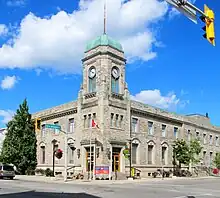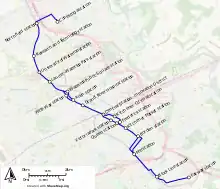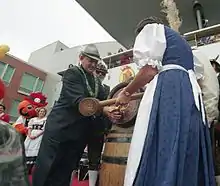
The Region of Waterloo is a region in southwestern Ontario that spans the gap between the traditional agrarian life of the Mennonites of St. Jacob's to the leading-edge technology businesses of Waterloo, with some beautiful countryside in between.
Cities
- 🌍 Ayr — a former village that now is home to many commuters
- 🌍 Cambridge — a small city at the confluence of the Grand and Speed rivers
- 🌍 Elmira — a town with the largest Old Order Mennonite community in Canada holds what is claimed to be the largest maple syrup festival in the world in late March
- 🌍 Kitchener — a medium-sized city with a strong German heritage (it used to be called Berlin)
- 🌍 New Hamburg — a town with a historic downtown core and a 50 ft (15 m) waterwheel
- 🌍 St. Jacobs — the main tourist destination in the region because of its historic village and its huge market where local Mennonite and Amish families sell their products
- 🌍 Waterloo — a small city known for its two universities and its many technology companies
- 🌍 Wellesley — a village that celebrates local products with its Apple Butter and Cheese Festival in late September
Other destinations
Understand

The Region of Waterloo is a regional municipality in Southwestern Ontario. It was created in 1973 in a reorganization of the local governments of the area. It consists of seven municipalities: three cities, Cambridge, Kitchener, and Waterloo, and four townships, North Dumfries Township, Wilmot Township, Woolwich Township, and Wellesley Township.
Get in
By car
Ontario's main east-west expressway, Highway 401, runs through Waterloo Region, separating the cities of Kitchener and Cambridge. Highway 8 runs from the 401 into Kitchener, Highway 7 runs from Guelph to Stratford, straight through Kitchener, also serving the towns to the east and west of Kitchener, the Conestoga Parkway runs from Highway 8, through Kitchener and Waterloo to the towns to the north. Hespeler Road (also known as Highway 24) runs from the 401 through Cambridge.
By train
- Main article: Kitchener#Kitchener Railway Station
Kitchener Railway Station, near Downtown Kitchener, hosts VIA Rail and GO Transit trains. Via Rail trains run to Toronto in the east and London and Sarnia in the west. GO Transit trains run to Toronto but only during rush hours in the peak direction. The railway station lies 650 metres east of ION Central Station, where one can take the ION light rail line through Kitchener and Waterloo, or south to ION Fairway Station to catch the ION bus route 302 to Cambridge.
GO Transit customers are eligible to one free ride on Grand River Transit (GRT) vehicles (buses and ION light rail line) to and from Kitchener Railway Station. To receive the free ride, GO customers must show the GRT bus driver or fare inspector a Presto card, a single-ride GO Transit ticket or a GO Transit day ticket. With this one exception, Presto and GO Transit fare media are otherwise not valid for Grand River Transit.
By intercity bus
The Kitchener Railway Station in Kitchener serves GO Transit buses as well as Via Rail and GO Transit trains. GO buses make a stop here before continuing to University of Waterloo Station via Wilfrid Laurier University in Waterloo. Nearby Central Station on King Street, you can catch a ION light rail train to ION Fairway Station to catch ION bus 302 to Cambridge.
There are few stops serving intercity buses in Cambridge.
By air
American Air Lines offers flights from Chicago, and WestJet offers seasonal service from Calgary via the Region of Waterloo International Airport.
Get around
By car
Waterloo Region is generally a car-centric community, and it's usually straightforward to drive from one point to another. Parking is usually free and abundant, except around the University of Waterloo and at some special events.
By public transportation

Grand River Transit (GRT), ☏ +1 519-585-7555. Grand River Transit is the public transit authority in Waterloo Region operating light rail, express buses and local buses. Fares are $3.25 cash, $2.76 with an EasyGO fare card, children 4 and under free. Day passes ($8) are available via an EasyGO fare card for a single adult on weekdays or for families (up to 5 people, maximum 2 adults) on weekends and holidays. An EasyGO fare card costs $5, to which either a day pass is attached or a minimum $10 balance is uploaded.
ION Light rail (route 301) serves major destinations, such as Downtown Kitchener, Uptown Waterloo, Conestoga and Fairway malls (northern and southern termini for ION light rail) and the two universities. This is the primary public transit service for visitors traveling within the twin cities of Kitchener and Waterloo. The ION light rail line has 19 stations along the route; however, four stations in Downtown Kitchener and two in Uptown Waterloo serve only one direction each as in these areas the line splits by direction to run along separate parallel streets. ION trains run at least every 10 minutes weekdays during the day, and every 15 minutes evenings, weekends and holidays.
ION bus (route 302, formerly route 200) connects with ION light rail at ION Fairway station and runs express to the Ainslie Street Transit Terminal in Cambridge. ION bus runs every 10 minutes weekdays during the day, every 15-30 minutes on weekday evenings, and every 30 minutes on weekends and holidays.
iXpress is the brand name for several express bus routes for longer distance travel within the region. iXpress buses are numbered as routes 201-205.
There are about 45 local bus routes serving various areas of Cambridge, Kitchener, and Waterloo. Buses usually operate on 30-minute schedules, but service may be more frequent during rush hour, or less frequent during off-peak hours or weekends (many routes have no Sunday service). So, schedules are useful; online schedules are available. Printed schedules can be obtained at the bus terminals and at the universities, or acquired piecemeal on buses. Each bus stop sign also lists a phone number that can be called to get an automated message giving the next arrival times. A detailed map of all routes in Kitchener, Waterloo and Cambridge can be purchased at a variety of locations for $2 or downloaded for free from Grand River Transit.
Every ION light rail station has two fare vending machines selling single ride tickets and EasyGO fare cards; they accept cash and debit/credit cards. EasyGO cards must be tapped on a post on the platform or inside a bus entrance. As of July 2019, single-ride tickets have a printed expiry time of 90 minutes after the time of purchase; thus, do not purchase extra tickets for later use. Eventually (perhaps later in 2019), single-ride tickets will need to be activated by passing its bar code on the vending machine's scanner before boarding. (As of July 2019, platform scanners were not operational.)
Buses have a fare box that acts like a vending machine and accepts coins; after paying by coins, you should request a transfer from the machine. The fare box also has a scanner to read bar-coded transfers from other routes. A transfer allows you to complete a trip using multiple vehicles (bus or ION light rail) within 90 minutes of paying your fare. If you transfer to ION light rail train, pass the bar-coded transfer over the scanner on the platform card reader (on a short post on the platform) before boarding the train.
See
Kitchener has a quite respectable museum, an art gallery, a heritage village, and a couple of national historic sites. The Mennonite Story Visitor Centre in St. Jacob's explains the history, culture and faith of the Mennonite people of this area, including their life, the clothing and homes.
The Cambridge Butterfly Conservatory has a tropical garden that is home to a wide variety number of butterflies, and it has a large insect collection.
The West Montrose Covered Bridge (also known as the Kissing Bridge), near Elmira, is Ontario's only covered bridge.
Do

African Lion Safari is a drive-through safari that is great for families.
The Kitchener-Waterloo Oktoberfest is a Bavarian festival held annually in October; it is the largest in the world outside of Munich, Germany. The 2020 edition was online due to the COVID-19 pandemic.

The St. Jacobs Farmers' Market is what draws visitors from central Ontario to the region. Over 600 vendors, including many Mennonite families, bring their fresh produce, baked goods, ethnic foods, furniture, and clothing.
The Waterloo Central Railway is a seasonal tourist service running a train of historic passenger cars, and a historic steam or diesel locomotive serving 4 stops between Waterloo and Elmira.
The Cambridge to Paris Rail-Trail is an 18-km (11-mile) trail follows the Grand River through lush Carolinian Forest with spectacular river overlooks en route. It does not go to France.
The Elmira Maple Syrup Festival, in early April, attracts 60,000 visitors, and is the largest one-day maple syrup festival in the world.
The Wellesley Apple Butter and Cheese Festival, in late September, attracts 40,000 visitors, and is the largest one-day Apple Butter and Cheese festival in Canada.
The Waterloo Buskers' Carnival, held annually in late August, calls itself "Canada's premier busking carnival". Acrobats, comedians, magicians and fire breathers perform in the streets of Waterloo for four days.
Stay safe
Safety is definitely not a problem in the Waterloo Region. Certain areas may be avoidable at nights due to muggings and weapons, but they are a rare occurrence and generally not dangerous to residents, never mind travellers. A lot of the student housing in Waterloo is known to have parties, and fights can break out and escalate. Downtown - as opposed to the Uptown in Waterloo or River Front in Cambridge - can be worrisome at night, as the majority of crime takes place in this area. Crack and heroin is often sold on the streets, prostitution is common in certain areas, and fights can break out. Typical city smarts are recommended. Overall, the Waterloo Region has a very low crime rate for the area, and in all of Canada.
Go next
Some options for further travel include:
- Guelph, a beautiful city located immediately to the east of the region.
- The Niagara Region - home to the Falls, the Shaw Theatre, a multitude of wineries, and many other tourist attractions.
- The Greater Toronto Area (GTA)